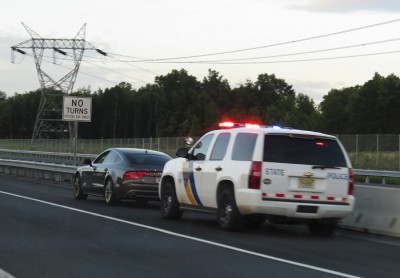Police can now stop you and search your vehicle even if you are not obviously violating the law, according to a new U.S. Supreme Court ruling.
In a landmark case called Heien v. State of North Carolina, the court ruled that an officer does not need to have a good knowledge of the law in order to conduct a warrantless search of a vehicle. Even if he wrongly pulls over a car when the driver was doing nothing wrong, he can legally search the car, and his search can stand up in court.
The ruling was 8-1, with Supreme Court Justice Sonia Sotomayor the sole dissenter.
“Departing from this tradition means further eroding the Fourth Amendment’s protection of civil liberties in a context where that protection has already been worn down,” Sotomayor wrote in her dissenting opinion.
The case started with a 2009 traffic stop in which Sgt. Matt Darisse of the Surry County Sheriff’s Department pulled over a car on Interstate 77 near Dobson, North Carolina, because it only had one working brake light. Darisse searched the vehicle and arrested its owner, Nicholas Brady Heien, after discovering a bag of cocaine.
Police Search Powers Expanded
Heien’s attorneys contended the search was unconstitutional because North Carolina state law does not require vehicles to have two working brake lights. Heien should never have been stopped, and Darisse was apparently unaware of the requirements for vehicle brake lights.
Learn How To Become Invisible In Today’s Surveillance State!
The case was appealed to a state appeals court, the North Carolina Supreme Court and the US Supreme Court. The state appeals court sided with Heien but the North Carolina Supreme Court upheld Heien’s conviction.
The Rutherford Institute, a civil liberties law firm, sided with Heien.
“Allowing law enforcement wide latitude to make mistakes of law will also have the effect of encouraging and increasing the number of legally baseless searches,” a friend-of-the-court brief filed by the Rutherford Institute’s attorneys claimed.
The Institute’s brief charged that the Heien decision will make it easier for police to stop and search people wherever they are.
“Not only are traffic stops a significant deprivation of liberty and privacy, they undermine the right to travel unimpeded,” the Rutherford brief claimed.
Where Do We Go From Here?
Chief Justice John G. Roberts disagreed with that assessment in the court’s majority opinion.
“The question presented is whether such a mistake of law can nonetheless give rise to the reasonable suspicion necessary to uphold the seizure under the Fourth Amendment,” Roberts wrote. “We hold that it can.”
He also noted that “reasonable suspicion” — in other words, an officer’s opinion — can form the basis for a search and seizure.
“Reasonable suspicion arises from the combination of an officer’s understanding of the facts and his understanding of the relevant law,” Roberts wrote. “Whether the facts turn out to be not what was thought, or the law turns out to be not what was thought, the result is the same: the facts are outside the scope of the law.”
Rutherford’s John W. Whitehead said the decision is a blow to freedom.
“By refusing to hold police accountable to knowing and abiding by the rule of law, the Supreme Court has given government officials a green light to routinely violate the law,” Whitehead said. ““This case may have started out with an improper traffic stop, but where it will end — given the turbulence of our age, with its police overreach, military training drills on American soil, domestic surveillance, SWAT team raids, asset forfeiture, wrongful convictions, and corporate corruption — is not hard to predict. This ruling is what I would call a one-way, nonrefundable ticket to the police state.”
It looks as if the power of police to conduct searches and seizures has been greatly expanded. Americans now have even more reason to be nervous when they drive or walk down the street.
Do you believe the Supreme Court was right or wrong? Share your thoughts in the section below:
 Off The Grid News Better Ideas For Off The Grid Living
Off The Grid News Better Ideas For Off The Grid Living




